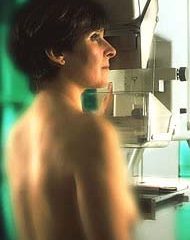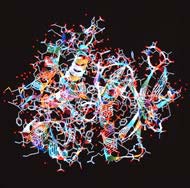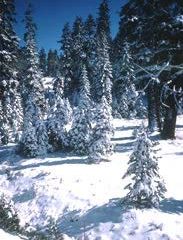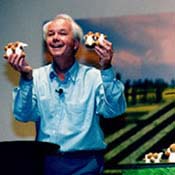
Study questions whether mammography saves lives.
Breast-cancer screening programmes may not save lives, according to a new examination of clinical trials. The controversial findings have led to calls for a re-evaluation of the routine monitoring procedure undergone by numerous women.
Mammography, X-ray breast imaging, is used in Europe and the United States to catch cancers early. “We’ve based a national screening programme on a set of results which do not stand up to scrut

Two techniques may help deduce proteins’ functions.
Imagine trying to guess what machines do just be looking at them. Even a can-opener would pose problems, if you didn’t know about cans. This is the challenge that faces molecular biologists as they try to make sense of protein molecules in the cell.
Two new techniques may help. One deduces a protein’s function from its shape; the other deduces its shape from a list of component parts 1 , 2 .

Meterologists look up for long-range forecasts.
Looking high into the atmosphere now might tell us whether we’re in for a white Christmas. Unusual stratospheric conditions herald changes in winter weather in the Northern Hemisphere up to two months later, say US researchers 1 .
The finding won’t let your weather forecaster warn you to wrap up warm two months hence, but it may be a valuable addition to meteorologists’ toolkits. “The effect works on average, bu

Deforestation is drying out cloud forests.
“It drips,” says ecologist Robert Lawton, describing the Costa Rican cloud forest, “and it’s plastered with plants of all sizes climbing over each other. Stand still for long and they’re growing on you.”
Now the lush life he describes may be threatened. Satellite pictures show that deforestation at the foot of western Costa Rican mountains is drying out swirling summit mists.
When warm, wet tradewinds blowing off the Caribb

A large, long-term study confirms that diet can help some epileptic children.
A strict high-fat, low-carbohydrate, calorie-restricted diet reduces seizures in children with intractable epilepsy. So concludes the largest and longest trial of an eating plan that was first suggested almost a century ago.
For about two years, epileptic youngsters on a ’ketogenic diet’ eat 25% less than normal and consume 90% of their daily calories as fats. They take vitamins and minerals to avo

Mathematician Ian Stewart talks to Nature Science Update about snowflakes, sticklebacks and a new kind of science.
Ian Stewart was turned on to mathematics at the age of seven. A broken collarbone freed him from an uninspiring teacher allowing his mother to ignite his interest in numbers while he was laid up at home.
His writing career began with a series of how-to manuals for now-defunct early 1980s microcomputers. It has since broadened into popular science and science fi